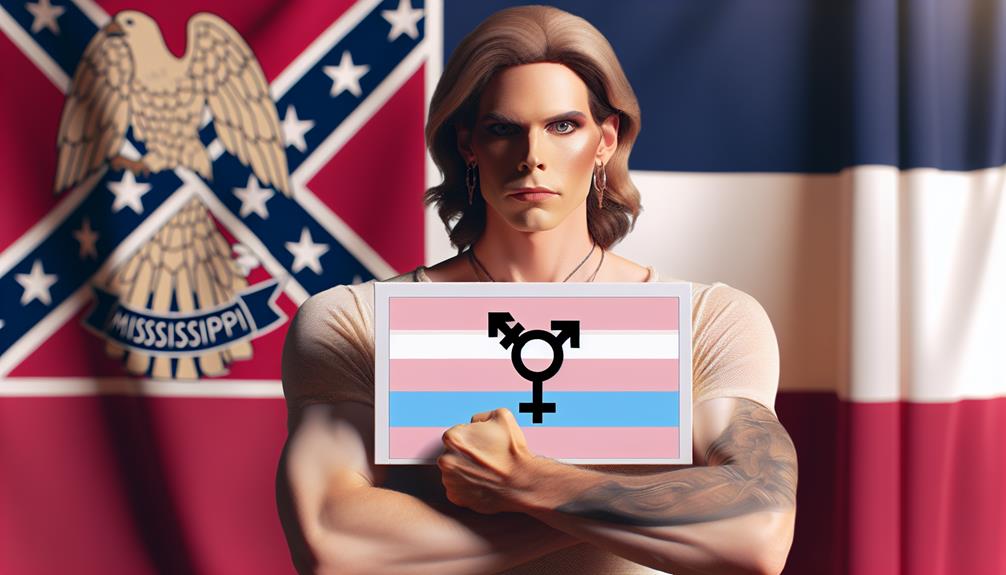Mississippi Transgender State of Affairs


Table of Contents
ToggleLegal challenges for transgender rights have intensified in Mississippi due to the recent enactment of restrictions on certain transition-related health care for minors. Mississippi has become the seventh state to enact a bill that prohibits minors from accessing puberty blockers, hormone therapy, and surgery for gender transition.
This bill not only restricts transition-related care for minors but also bans public funding for institutions or individuals providing such care, with consequences for health care providers who violate the law. The ACLU of Mississippi has voiced concerns about the impact of this bill on the rights of transgender youth and access to gender-affirming health care.
This development reflects a growing trend in at least 23 states, including Mississippi, where similar restrictions on gender-affirming health care for minors are being considered. National medical organizations such as the American Medical Association and American Academy of Pediatrics support access to gender-affirming care for minors.
However, the enactment of this bill raises concerns about the potential limitations on access to gender-affirming care for transgender minors in Mississippi and its implications for their well-being.
Despite the recent enactment of restrictions on certain transition-related health care for minors in Mississippi, access to gender-affirming care has become a pressing concern for the well-being of transgender youth. The ban on certain medical treatments and procedures for minors has raised questions about their healthcare access and civil rights.
The bill signed by the Mississippi Governor prohibits puberty blockers, hormone therapy, and surgery for minors, and also restricts public funding for institutions or individuals providing such care. Health care providers violating the law may face license revocation, and minors receiving transition-related care have the option to sue providers for 30 years after receiving care.
National medical organizations, such as the American Medical Association and American Academy of Pediatrics, support access to gender-affirming care for minors, emphasizing thorough evaluation and parental involvement.
The bill’s passage has sparked concerns about the rights of transgender minors and access to gender-affirming care, adding to a wave of state legislation targeting LGBTQ individuals, with at least 15 states considering similar measures this year.
The restrictions have brought healthcare access and affirmation to the forefront of discussions surrounding the well-being of transgender youth in Mississippi.
Amidst ongoing debates and legal developments, instances of discrimination against transgender individuals in schools and workplaces have drawn increasing attention in Mississippi.
The recent enactment of restrictions on certain transition-related health care for minors, including banning puberty blockers, hormone therapy, and surgery, has sparked concerns about the rights of transgender minors. This legislation not only limits access to gender-affirming care but also prohibits public funding for institutions or individuals providing such care, with healthcare providers facing license revocation for violations.
The bill’s passing raises questions about access to gender-affirming care and the impact on transgender individuals in educational and professional settings. Discrimination against transgender individuals in Mississippi isn’t limited to healthcare access; it extends to their experiences in schools and workplaces.
With at least 15 states considering similar measures targeting LGBTQ individuals, the American Civil Liberties Union and other advocacy groups are closely monitoring the situation. The ongoing legal developments and debates surrounding transgender rights in Mississippi reflect a complex state of affairs, highlighting the need for continued attention to the challenges faced by transgender individuals.
Seven states, including Mississippi, have recently enacted restrictions on certain transition-related health care for minors. Mississippi Governor Reeves signed a bill banning puberty blockers, hormone therapy, and surgery for minors, while also prohibiting public funding for institutions or individuals providing such care. Health care providers who violate the law risk having their licenses revoked, and minors who receive transition-related care have the option to sue providers for 30 years after receiving care.
This measure is part of a broader trend, with at least 23 states considering restrictions on gender-affirming health care for minors. The American Medical Association and American Academy of Pediatrics support access to gender-affirming care for minors. Opposition to the bill highlights the need for continued advocacy and legal challenges to protect transgender rights.
Community organizations and advocacy groups in Mississippi are actively mobilizing to support transgender rights and challenge the restrictions on gender-affirming healthcare for minors. Governor Tate Reeves recently signed a bill that prohibits gender-affirming care for transgender youth, including puberty blockers, hormone therapy, and surgery, as well as banning public funding for institutions providing such care. In response, these organizations are working to provide support for transgender youth and their families in Mississippi. They aim to raise awareness about the importance of best-practice medical care for transgender minors and advocate for the reversal of the state’s ban on gender-affirming care. These efforts align with the stance of national medical organizations such as the American Medical Association and American Academy of Pediatrics, which emphasize the necessity of gender-affirming care for minors and the crucial role of parental involvement and thorough evaluation. The community support and advocacy efforts in Mississippi are part of a broader national movement to safeguard the rights and well-being of transgender youth in the face of increasing legislative challenges.
Currently, in Mississippi, transgender rights and protections are limited. The state doesn’t have specific laws protecting transgender individuals from discrimination in areas such as employment, housing, and public accommodations.
Mississippi also doesn’t have laws allowing individuals to change the gender marker on their birth certificates. This lack of legal protections can lead to challenges and discrimination for transgender individuals in the state.
Healthcare providers in Mississippi navigate challenges of providing gender-affirming care to transgender individuals by staying informed on best practices and guidelines. They prioritize creating inclusive and welcoming environments, offering comprehensive services that address the unique needs of transgender patients.
Transgender students and employees in Mississippi have faced specific instances of discrimination in schools and workplaces. These include being denied access to gender-appropriate facilities, such as bathrooms and locker rooms, and facing harassment and bullying from peers and even staff.
Additionally, transgender individuals have reported being denied job opportunities or facing unfair treatment and termination based on their gender identity. Such discriminatory practices have contributed to a hostile environment for transgender individuals in these settings.
In Mississippi, transgender individuals face requirements and obstacles when seeking to change their gender marker on legal documents. This process often involves providing medical documentation and court hearings. The state’s laws can create challenges for transgender people navigating these procedures, impacting their ability to have legal documents that reflect their gender identity.
This can have significant implications for their daily lives, such as obtaining employment, housing, and accessing services.
There are several organizations and resources available in Mississippi to support and advocate for the transgender community. These include support groups, legal aid services, and advocacy organizations that work to promote transgender rights and provide resources for individuals in need.
Additionally, healthcare providers and mental health professionals in the state may also offer specific support and resources tailored to transgender individuals.
The recent legislation in Mississippi restricting transition-related healthcare for transgender minors has ignited legal challenges and debates over healthcare access and affirmation.
The state’s decision sends a clear message to transgender individuals – their journey for acceptance and support is an uphill battle.
Like a ship navigating through rough waters, the transgender community in Mississippi faces obstacles in their pursuit of equal rights and healthcare access.
 News and AdvocacyNovember 14, 2025Rainbow Victories: 2025’s Most Pro-LGBTQ+ States Revealed
News and AdvocacyNovember 14, 2025Rainbow Victories: 2025’s Most Pro-LGBTQ+ States Revealed News and AdvocacyNovember 14, 2025Transgender Sanctuary States: Protecting Rights, Providing Hope
News and AdvocacyNovember 14, 2025Transgender Sanctuary States: Protecting Rights, Providing Hope Featured PostsNovember 13, 2025When Restroom Policing Backfires: The Hotel That Went Too Far
Featured PostsNovember 13, 2025When Restroom Policing Backfires: The Hotel That Went Too Far Featured PostsNovember 13, 2025Sex, Safety, and Seduction: A Trans Girl’s Guide to Hookups
Featured PostsNovember 13, 2025Sex, Safety, and Seduction: A Trans Girl’s Guide to Hookups